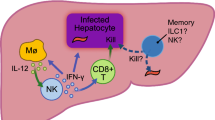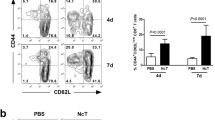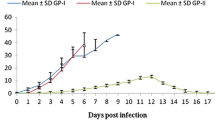Abstract
Mice that have recovered from a primary infection with Plasmodium chabaudi have been shown to resist a secondary infection. In the present study the authors investigated how natural killer (NK) cells were involved in this resistance. Spleen cells from P. chabaudi-primed C57BL/6 mice could transfer protection against P. chabaudi infection into naive syngeneic mice, but spleen cells from unprimed mice could not. T-enriched cells purified from primed spleen cells could also transfer such protection. Transfer of NK cells from primed spleen cells failed to protect against challenge infection. However, depletion of NK cells in host mice by injection of an anti-NK1.1 monoclonal antibody resulted in higher mortality relative to controls. The possible protective roles of NK cells in P. chabaudi infection are discussed.
Similar content being viewed by others
Author information
Authors and Affiliations
Additional information
Received: 27 July 1995 / Accepted: 27 October 1995
Rights and permissions
About this article
Cite this article
Kitaguchi, T., Nagoya, M., Amano, T. et al. Analysis of roles of natural killer cells in defense against Plasmodium chabaudi in mice. Parasitol Res 82, 352–357 (1996). https://doi.org/10.1007/s004360050125
Issue Date:
DOI: https://doi.org/10.1007/s004360050125




